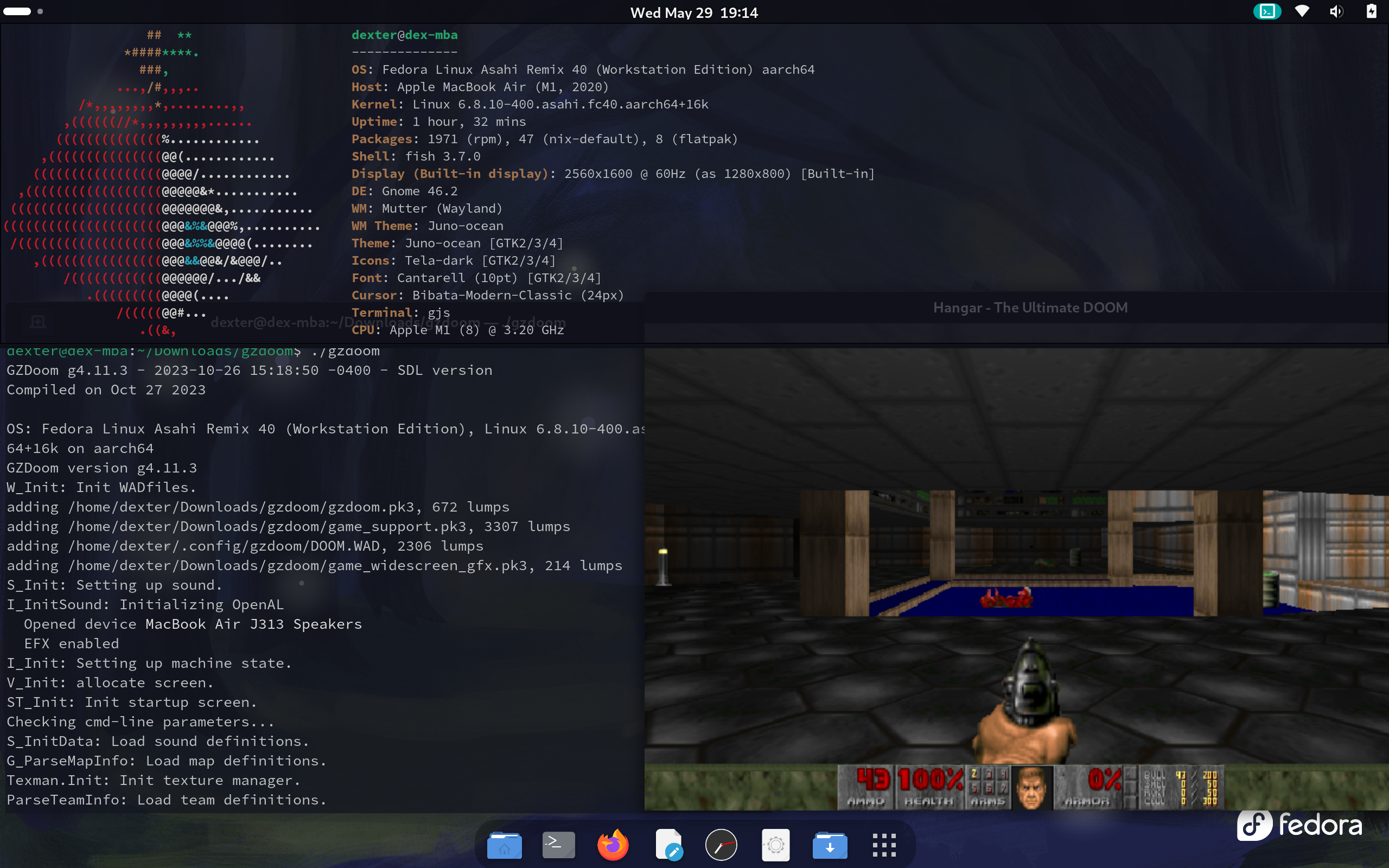- cross-posted to:
- apple_enthusiast@lemmy.world
- cross-posted to:
- apple_enthusiast@lemmy.world
Update : more games!
I’m still in shock how quickly they have progressed.
So how does that work given that most Steam games are x86/x64 and the M2 is an ARM processor? Does it emulate an x86 CPU? Isn’t that slow, given that it’s an entirely different architecture, or is there some kind of secret sauce?
Emulation.
Definitely going to incur a performance hit relative to native code, but in principle it could be perfectly good. It’s not like the GPU is running x86 code in the first place. On macOS, Apple provides Rosetta to run x86 Mac apps, and it’s very, very good. Not sure how FEX compares.
Virtualization actually, dont know why though
Why not click the link and find out? It’s literally a Mastodon post, you don’t even have to read much.
The post doesn’t answer the questions, it’s why I asked.
It says:
All running on a krun microVM with FEX and full TSO support 💪
I was not expecting Party Animals to run! That’s a DX11 game, running with the classic WineD3D on our OpenGL 4.6 driver!
Now I know some of these words, but it does not answer my question.
Man ,idk why everyone is being a dick to you. A MicroVM is a virtual machine that only emulates a small subset of an entire OS (a container basically). FEX is an x86 emulator. So yes, this is emulation.
Thanks.
FEX is an x86 emulator
So my real question is really about this: common wisdom is that emulating a whole CPU architecture is a performance killer. Does that apply here, and are they just running games that can take the hit? Or phrased differently: given that it’s emulated, could this ever have near-native (CPU) performance, or nah?
Probably not, but it might be good enough. I’m not an expert in architecture emulation by any stretch, but it might work best for older games where modern performance is a non issue either way.
You asked how it works, the post states how it works. You also asked if it’s slow, which is clearly answered in the post (though you didn’t quote that part). You also asked if there’s some “secret sauce” allowing it to be fast, which is also a weird question since everything used is listed in the post.
If something wasn’t clear to you, why not specifically ask about it? Even in this comment, you still don’t specify what you don’t understand. What kind of answer are you expecting to get?
deleted by creator
You can Google the words you don’t know, and find out that it does in fact answer your question.
Yeah god forbid people have some interesting discussion on this platform, right?
Just to offer some support, you’re right and those are good questions
She’s the GOAT
I wanna do Mesa because of Lina
The brain however does not want to cooperate (it wants to defrag)
I’ve always thought GOAT stands for Gentleman Of All Trades. I make a wild guess it’s Girl Of All Trades in this case?
Always thought it was “Greatest of all time”
Yeah, that’s what I meant too.
The Gods be damned it can run Crysis
I have no idea what asahi linux is and at that point I am to afraid to ask
Fedora linux distribution for apple silicon (M series) computers
With added firmware/drivers for better hardware compatibility
Yeah, I think my comment really undersold the work that the Asahi team has been doing
Asahi means “rising sun” in Japanese, and it is also the name of an apple cultivar. 旭りんご (asahi ringo) is what we know as the McIntosh Apple, the apple variety that gave the Mac its name.
If you’re thinking what I’m thinking, it doesn’t seem to have anything to do with beer.
Isn’t it cause its the handle of the main dev?
No, lead dev is marcan. Asahi Lina is a vtuber who had reverse-engineered Apple GPU and wrote the driver for it (in tandem with Alyssa Rosenzweig)
They are both on Mastodon. Lina just posted an updated list of games, there’s a ton of them
Or Let Me Duck That For You for added snarkiness
TIL: that exists.
Linux distro for apple ARM devices with reverse engineered drivers.
Asahi Linux is the “have linux run on apple M series CPUs” project
BUT CAN IT RUN CRYSIS
Yes it can
No Doom?
Since you asked…

Now it’s complete! No party without Doom. ^^
The Asahi team never fails to impress. You can support the project at their Patreon. You don’t need to care about Apple hardware to see the value in the work they’re doing getting ported over to ARM PCs. Who knows? You might be donating to the health of your preferred distro on a device you will own down the road.
Btw the “official COPR” for
krunon Fedora seems unmaintained, but there is a new one with recent builds.








